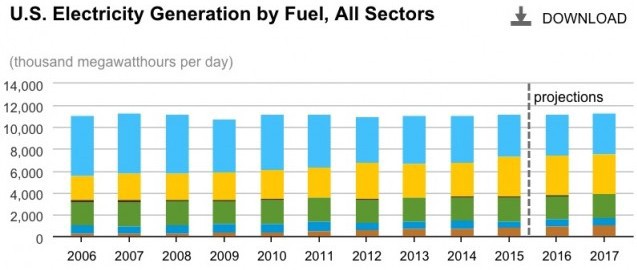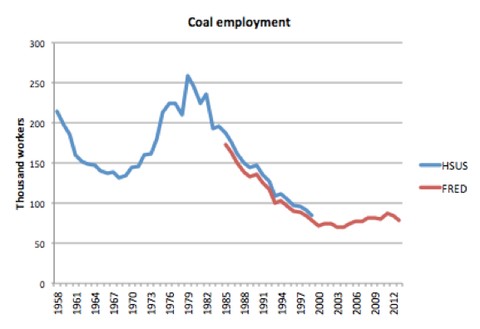Bloomberg New Energy Finance (BNEF) has a message for the new president: You are not going to bring coal back.
Donald Trump won the presidency with claims that he is a brilliant businessman who will create jobs. He railed against a political “war on coal” supposedly waged by President Obama, one Trump claimed was “killing American jobs.” On his first day in office, Trump deleted all the climate change references on the White House website, replacing it with an “energy plan” that asserts he is “committed to… reviving America’s coal industry.”
In a new analysis, leading independent energy experts at BNEF dismantle these claims. “Whatever President Trump may say, U.S. coal’s main problem has been cheap natural gas and renewable power, not a politically driven ‘war on coal,’” explain BNEF chair Michael Liebreich and chief editor Angus McCrone. Therefore “it will continue being pushed out of the generating mix.”
They note global electricity demand has grown much less than expected (thanks in part to energy efficiency). This 2016 Energy Information Administration (EIA) chart shows the trend here:

In a world of flat demand, the electricity market is a ruthless game of musical chairs — where the slowest and most unwieldy power sources keep losing their seat.
Coal power is just too costly and inflexible, explains BNEF: “Super-low-cost renewable power — what we are now calling ‘base-cost renewables’ — is going to force a revolution in the way power grids are designed, and the way they are regulated.”
When you add the revolution in cheap fracked gas — which Trump has pledged to double down on — it’s no surprise the country shut down over 40 gigawatts of coal-fired power stations since 2000. “These will not reopen whatever anything President Trump does,” explains BNEF, “nor do we see much appetite among investors for ploughing money into U.S. coal extraction — stranded asset risk will trump rhetoric.”
Indeed, coal’s woes are not merely being driven by a collapse in the economic case here. It’s also being driven by a collapse in the export market, as countries from Europe to Asia also move away from coal because of its economic and human cost. Coal pollution is killing people and destroying the climate.
BNEF lists what’s going on:
- In the U.K., coal-firing shrunk to a minuscule 3.6 percent of total electricity production in the third quarter of 2016
- Other European countries are finally — and belatedly — turning their attention to forcing the early retirement of coal plants.
- China has just announced the suspension of plans for 100 new coal plants, including ones whose construction has already begun
- India’s Electricity Central Electricity Authority has said that after the current crop of coal-fired power stations under construction are completed, the country will need no new ones until 2027.
“Peak coal is coming sooner than expected,” Goldman Sachs told clients in a September research note. BNEF agrees.
So Trump won’t be bringing back the domestic coal industry. And even if he could, he can’t bring back the jobs because it’s the coal industry itself that wiped out most of those jobs through productivity gains from “strip mines and machinery,” as Nobel Prize-winning economist Paul Krugman explained in 2014.

The fact is clean energy jobs are the only major new source of sustainable high-wage employment in the coming decades. Tragically, Trump’s misguided policies — his war on clean energy — mean the U.S. may not benefit from this exploding $50-trillion industry.
